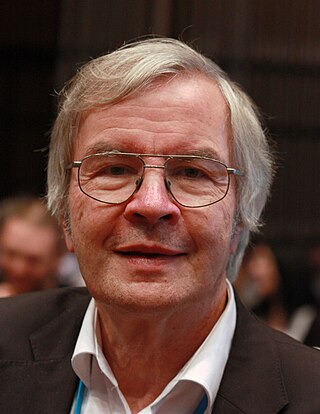Related Research Articles

Bert Sakmann is a German cell physiologist. He shared the Nobel Prize in Physiology or Medicine with Erwin Neher in 1991 for their work on "the function of single ion channels in cells," and the invention of the patch clamp. Bert Sakmann was Professor at Heidelberg University and is an Emeritus Scientific Member of the Max Planck Institute for Medical Research in Heidelberg, Germany. Since 2008 he leads an emeritus research group at the Max Planck Institute of Neurobiology.
Dieter Lüst is a German physicist, full professor for mathematical physics at the Ludwig Maximilian University of Munich since 2004 and a director of the Max Planck Institute for Physics in Munich. His research focusses on string theory. In 2000, he received the Gottfried Wilhelm Leibniz Prize of the Deutsche Forschungsgemeinschaft, which is the highest honour awarded in German research.

Theodor Wolfgang Hänsch is a German physicist. He received one-third of the 2005 Nobel Prize in Physics for "contributions to the development of laser-based precision spectroscopy, including the optical frequency comb technique", sharing the prize with John L. Hall and Roy J. Glauber.

The Gottfried Wilhelm Leibniz Prize, or Leibniz Prize, is awarded by the German Research Foundation to "exceptional scientists and academics for their outstanding achievements in the field of research". Since 1986, up to ten prizes have been awarded annually to individuals or research groups working at a research institution in Germany or at a German research institution abroad. It is considered the most important research award in Germany.

Ferdi Schüth is a German chemist.
The Max Planck Institute for Solid State Research was founded in 1969 and is one of the 82 Max Planck Institutes of the Max Planck Society. It is located on a campus in Stuttgart, together with the Max Planck Institute for Intelligent Systems.

Science and technology in Germany has a long and illustrious history, and research and development efforts form an integral part of the country's economy. Germany has been the home of some of the most prominent researchers in various scientific disciplines, notably physics, mathematics, chemistry and engineering. Before World War II, Germany had produced more Nobel laureates in scientific fields than any other nation, and was the preeminent country in the natural sciences.
Frank Steglich is a German physicist and the founding director of the Max Planck Institute for Chemical Physics of Solids in Dresden, Germany.

Günter Matthias Ziegler is a German mathematician who has been serving as president of the Free University of Berlin since 2018. Ziegler is known for his research in discrete mathematics and geometry, and particularly on the combinatorics of polytopes.
Theo Geisel is a German physicist. Geisel is a director at the Max Planck Institute for Dynamics and Self-Organization and professor of theoretical physics at the University of Göttingen. His research is primarily concerned with the behavior of complex systems ranging from theoretical investigations in quantum chaos to nonlinear phenomena occurring in the brain.
Karl Leo is a German physicist.
Hans-Peter Seidel is a computer graphics researcher at the Max Planck Institute for Computer Science and Saarland University.
Jochen Mannhart is a German physicist.
Ilme Schlichting is a German biophysicist.

Petra Schwille is a German professor and a researcher in the area of biophysics. Since 2011, she has been a director of the Department of Cellular and Molecular Biophysics at the Max Planck Institute for Biochemistry in Martinsried, Germany. She is known for her ground-laying work in the field of fluorescence cross-correlation spectroscopy, and numerous contributions on model membranes. Her current research focuses around bottom-up approaches to building an artificial cell within a broader area of synthetic biology. In 2010, Schwille received the Gottfried Wilhelm Leibniz Prize.

Bernhard Wilhelm Roth is a German experimental physicist.
Christine Silberhorn is a German physicist specialising in quantum optics, full professor at the Paderborn University. In 2011, Silberhorn was awarded the Leibniz Prize and was the youngest recipient of the 2.5 million Euro prize at that time.
Stefan Grimme, is a German physical chemist; he completed a Ph.D. thesis on photochemistry at Technical University of Braunschweig in 1991; he is a professor at the Universität Bonn since 2011 who is active in the field of computational chemistry; he was elected a member of the Academy of Sciences Leopoldina in 2018.
Susanne F. Yelin is a German physicist specializing in theoretical quantum optics and known for her work in quantum coherence and superradiance. She is a professor of physics at the University of Connecticut, a professor of physics in residence at Harvard University, and vice director of the Max Planck/Harvard Research Center for Quantum Optics.
Eduard Arzt is an Austrian physicist and materials scientist. He is the recipient of the Gottfried Wilhelm Leibniz Prize, the highest research award of the German Research Foundation (DFG), the Acta Metallurgica Award, and the Heyn-Award, the highest award of the German Materials Society (DGM). He is a member of the German Leopoldina Academy of Sciences in Halle, and a corresponding member of the Austrian Academy of Sciences in Vienna. In 2020, Arzt was elected an international member of the US National Academy of Engineering
References
- ↑ Max Planck Society (2022-01-31). "Subfemtosecond imaging of quantum electronic coherences in molecules". phys.org. Retrieved 2022-07-16.
By cleverly combining established techniques of tunneling microscopy and laser spectroscopy, a team led by Klaus Kern, Director at the Max Planck Institute for Solid State Research in Stuttgart, has now overcome these obstacles. Using their atomic quantum microscope, they can make the movement of electrons in individual molecules visible.
- ↑ Klaus Kern publications indexed by Google Scholar